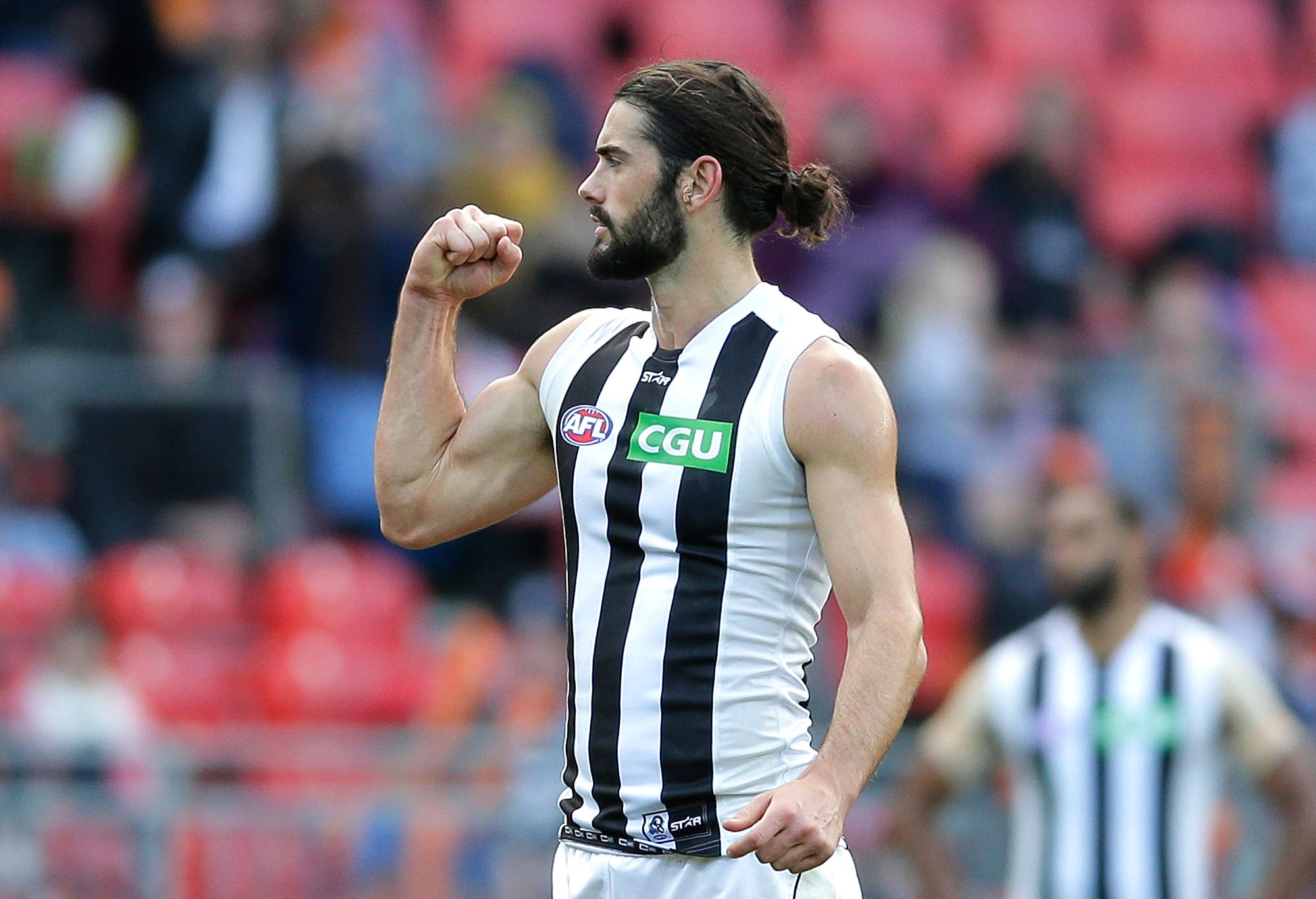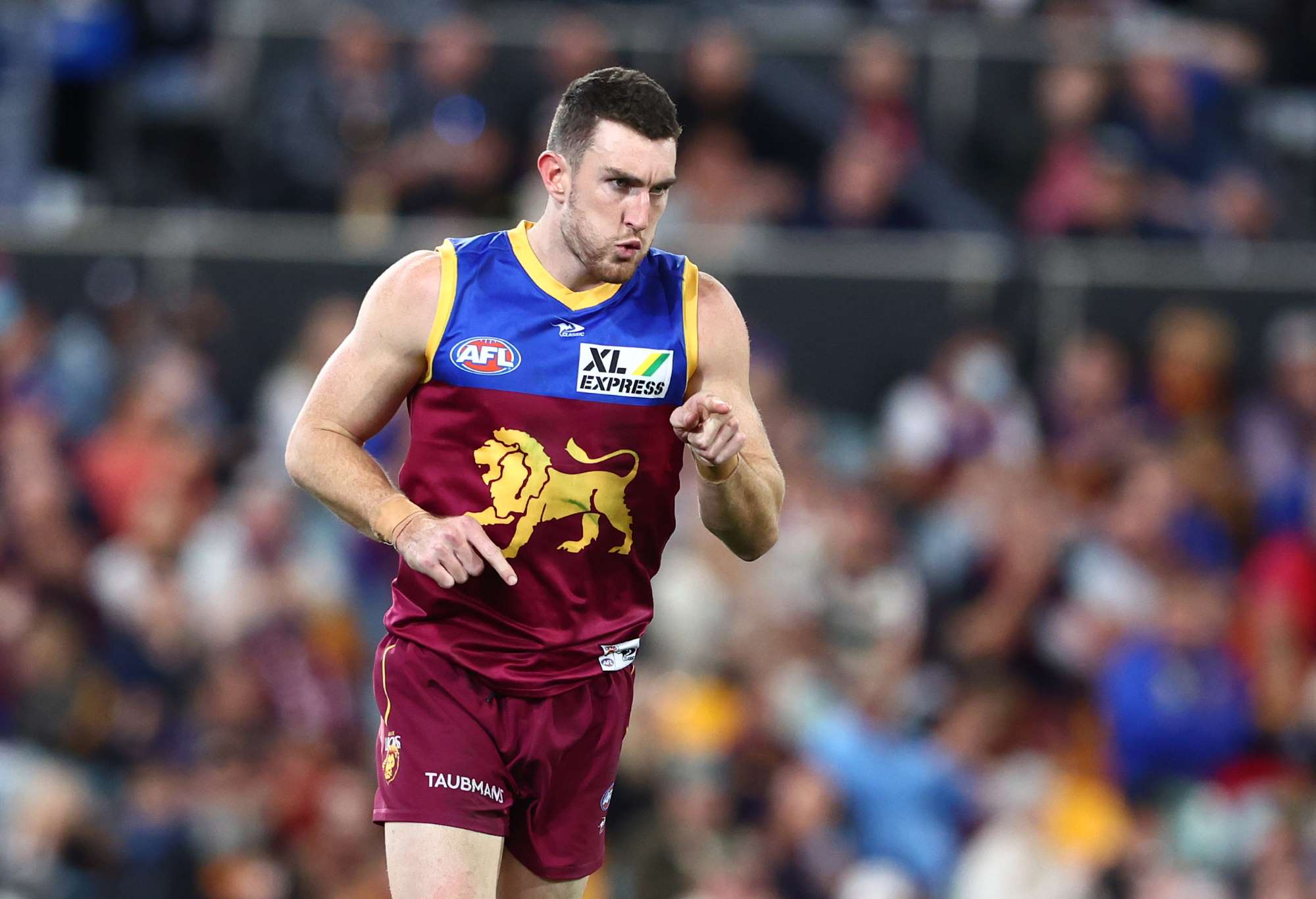Brodie Grundy has been completely hard done by.
In 2019, Grundy won his second consecutive All-Australian jacket, Collingwood’s best and fairest, and finished equal sixth in the Brownlow Medal.
Imagine telling anyone that three years later, the Magpies would be pushing him out the door, and that the most interested suitor was the club that had the other dominant ruck in the league.
The situation is a messy one; not that it’s an unfamiliar scenario for the Pies.
Sure, many raised their eyebrows at the mammoth seven-year deal Grundy accepted at the end of 2019, putting him on nearly $1 million a season. But given his most recent accomplishments at the time, securing his signature amid interest from other clubs meant it was a justifiable move.
We know now the way the Magpies have dealt with larger contracts in recent times. Adam Treloar and Jaidyn Stephenson are the obvious ones, and the fact the club have come out positively on the other side may end up minimising some of the criticism that ends up being drawn should they do the same to Grundy.
It’s true that, since his re-signing, Grundy has failed to recapture his best form, and has had to deal with more niggles and injuries than he had been upon entering his prime.
There’s a case to suggest the COVID-shortened 2020 season was a particularly difficult one to navigate for the league’s premier four-quarter ruckman. Grundy prides himself on getting from contest to contest; while he led the AFL in hitouts that season, his influence around the ground was slightly nullified by the fact the opposition big man could match him stride for stride.
2021 was a bad season for Collingwood, but the 28-year-old was one of the team’s better players; yet there were warning signs already, with his ruck contest attendance dropping from 79 per game in 2019 to 60.8 in 2021.
He started off 2022 well, but never came back after Round 6 after a knee injury on ANZAC Day and ankle problems upon his VFL comeback later in the year.
Actively seeking to trade a player who wants to stay is a massive move that has the potential to have a cultural impact at a footy club, yet it’s a risk Collingwood seem willing to take.
From the Magpies’ perspective, it’s not so much that they’re delighted to let a player of Grundy’s quality leave, but rather see it as necessary to afford them the flexibility they’re aiming to give themselves going forward. It’s the same way Geelong, Hawthorn and Richmond have tried to structure their squads and financials in their years of success.
Statistically, they were starting to phase Grundy out a little, and his injury ended up being a blessing. It allowed for the emergence of the clearly talented Darcy Cameron, who’d waited more than half a decade for his crack at a first ruck spot, as well as enable a rotation with Mason Cox, who took over the majority of the split as the season wore on.
Collingwood is of the belief that, given recent successful clubs haven’t had to rely upon dominant rucks, Grundy’s is such a negative contract that it leaves them handcuffed for the future.
Of course, they may be right. Grundy will be 29 next season and coming off a major injury. There’s a chance that he never recaptures his best form, and the contract will look silly. And absolutely, the Magpies trying to realign and restructure their contracts and playing group is likely to give them more flexibility going forward.
The issue here isn’t necessarily the outcome, but the method.

Brodie Grundy (Photo by Mark Metcalfe/Getty Images)
Collingwood is no longer looking at its players as players, necessarily. They’ve moved towards an extremely transactional business: one of exchanging commodities and balancing books to maximise their own return on the field.
In doing so, they’re so keen to get rid of these players and their long-term commitments, that they’re paying percentages of salaries to players that aren’t in black and white anymore, deeming them sunk costs.
The switch here is obvious: Dan McStay is in from Brisbane, and Grundy is out. That shifts their commitment to $600,000 over five years, compared to $1 million.
We can reasonably speculate that whatever the trade for Grundy is, with likely Melbourne, the Magpies won’t need to cover 40 per cent of Grundy’s salary; meaning in this transaction, the club is probably better off. It’s also more palatable to trade a $600,000 per year contract in the future if things don’t work out with McStay.
Here’s the thing, though – the Magpies are setting a dangerous precedent in their bid to create a more ideal financial situation, one in which a trust issue could emerge going forward.
If Collingwood are operating as transactionally business-like as it seems, then they’ll absolutely be met with scepticism from players and their managers amid the discussion to sign long-term contracts in the future.
Brodie Grundy has been a star of the competition previously, the sort of player every team would love to have. They don’t grow on trees. When he plays, he should still be influential.
If the Magpies believe he’ll be nowhere near that sort of player ever again, trading him is logical. It just doesn’t feel as though that’s the reason, though – all we’ve heard are financial reasons.
From an on-field perspective, you’d imagine Craig McRae has a perfect role carved out for McStay.
He’s an absolutely solid player, without doubt. His 23 disposals, 10 hitouts and 6 tackles against Richmond in the elimination final when Oscar McInerney went down was incredible. Less than a month earlier, he had 16 disposals and kicked four goals against Carlton.

(Photo by Chris Hyde/AFL Photos/via Getty Images )
McStay’s at his best, though, when he can push up to the wing and is given the freedom to roam around. Think of him as a bootleg Jeremy Cameron as a forward, with the extra ability to leap in the ruck, but not quite the ability to handle close defensive attention.
He isn’t a team’s main key forward, yet he’s being sought after like one. That forward mix for Collingwood will be agile, but without a focal point yet again.
In Grundy, they’re losing that ability to use Cameron’s size as a key forward more often. Cox only has limited time left, and if the plan is for McStay to replace him in a ruck split, then things will go south.
What McRae could have done was what Melbourne did with Max Gawn and Luke Jackson in 2021, or even Geelong with Rhys Stanley and Mark Blicavs at the end of this season: divide the number one ruck role between Grundy and Cameron.
Grundy is fit enough to play as an extra midfielder, but also smart enough to function as a defensive nuisance, in the way of the key forwards while defenders rotate a little higher. That way, you have a forward-half ruckman, and one that takes the rest.
It could have left the Magpies with a constant focal point.
On the other hand, never could it have been imagined that Grundy and Gawn would be teammates, but it’s Melbourne’s solution to woes they’ve been having at either end.
In 2023, expect Sam Weideman to play behind the ball if he stays at the Demons. Youngster Jacob van Rooyen is likely to get considerable game time in attack to add another sizeable target.
In the bid to get Grundy, Melbourne will surely use him as the main ruckman, and skipper Gawn will be the one to fill gaps around the ground. In attack, no one can match his reach. In defence, there’s no better intercept marker than a resting ruck with more size than anyone else – and Gawn is superior to them all in the air.
Melbourne gets an extra midfielder/ruckman that can do grunt work around the ground in Grundy. Don’t forget that in those two elite seasons, he averaged 20 disposals, five tackles and five clearances.
The Demons are getting a sure-fire, quick fix to solve their problems in either arc, and it doesn’t seem like they will have to pay much for it either in the way of draft picks.
Collingwood is bargaining that Grundy was simply a rusty cog in a machine that needs a new part.
It’s a dangerous way to approach football, particularly from a team that has seemingly been rejuvenated under a new coach.
CLICK HERE for a seven-day free trial to watch the AFL on Kayo Sports.
The way the best teams have structured their playing group and contracts has often been the underlying, truthful way to long-term success.
Blindsiding loyal players like Grundy as a means to get there might end up positively in the books, but the reverberations culturally can linger just as long as the success a team is striving for.
Collingwood is willing to risk that trust and happiness in the playing group will be unharmed in future contract negotiations, to create a more flexible financial arrangement going forward.
Brodie Grundy is the scapegoat; but he and Melbourne may end up coming out of this situation better than the Magpies.






























































































